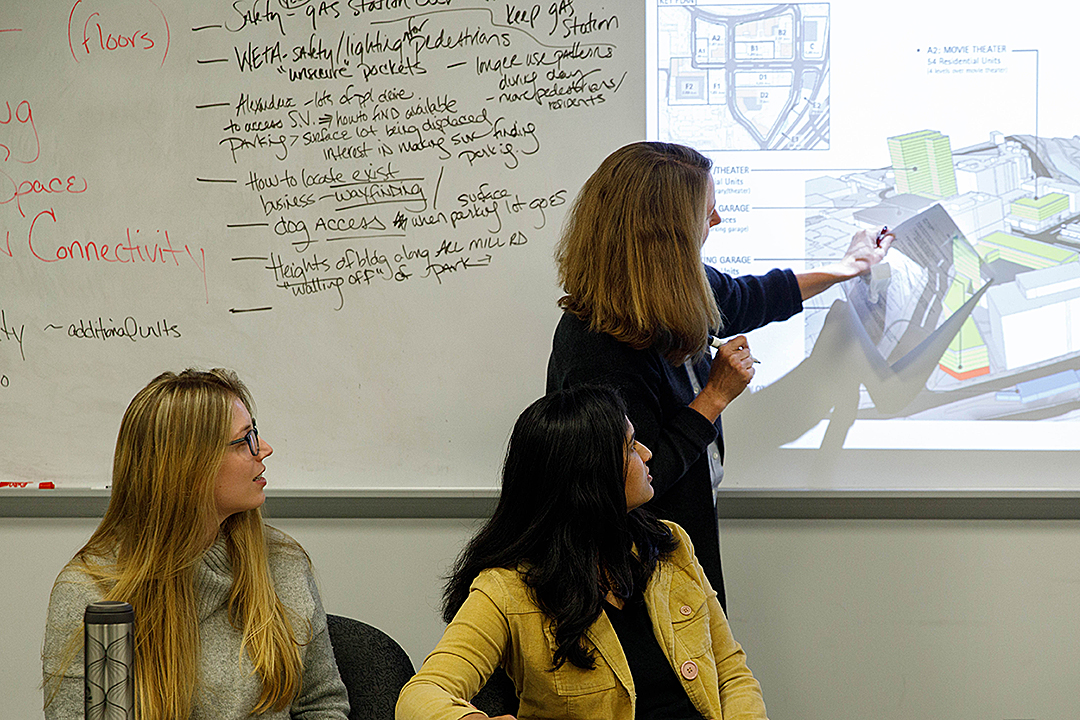“Modernize the village, but keep it a village,” remarked one resident of Shirlington Village, as noted in the report produced by Sustainable Urban Planning (SUP) master’s degree students in the studio class this fall. This resident’s sentiment to retain the “small town feel” of Shirlington Village summed up how many community residents felt about the proposed land use changes.
SUP students enrolled in the studio course gained hands-on professional planning experience through a partnership with Arlington County’s Department of Community Planning, Housing and Development. The students had the opportunity to work directly with professional planning staff in Arlington County, and participate in a real land use study plan. They assisted Arlington County with a community education and input session about proposed changes to the Shirlington Village neighborhood. They solicited input directly from residents as part of the land use study and presented their final report and recommendations to Arlington County leadership in December.
“Our long-term partnership is a win-win for Arlington County and the University – over the past three years, the GW Sustainable Urban Planning studios have provided students with hands-on planning experience and several Arlington planning projects have benefitted from their contributions and fresh insights,” said Robert J. Duffy, FAICP, Planning Director, Arlington County’s Department of Community Planning, Housing and Development.
“The studio projects are just one facet of our deeply rooted relationship with the program. Arlington’s planning staff have participated in a number of courses and I had the opportunity to serve on the advisory council for the program’s development and accreditation. We are fortunate to have GW’s Sustainable Urban Planning program located in Arlington’s Ballston Metro center,” said Duffy.
This fall, County planning staff asked the students to assist staff in conducting a community engagement charette for the Shirlington Village study. They wanted to find out how the residents felt about their proposal changing the zoning from low to medium mixed-use density, which included adding apartments and bus transit routes, amongst other ideas. The students built upon work already started by the planning staff, including historical research, a walking tour of the subject area, a parking study and development of 11 guiding principles.
“I really enjoyed interacting with the community, seeing the impact of the project planning and being able to get a feel for what the planner career is like outside of the Navy,” said Danielle Ambersley, a 2020 SUP master’s degree candidate, who currently works as a community planner for the U.S. Navy.
The residents of the Village were especially interested in preserving the “small-town feel” and unique historical charm of the area. While they were also concerned about features like walkability, outdoor dining, restricting the heights of buildings, and protecting the park, many residents recognized the necessity for some changes to drive economic growth and vitality in the neighborhood. Residents considered the local shops & restaurants the area’s greatest asset and recognized the need to drive more customers into Shirlington to support the businesses.
“Residents and stakeholders were passionate about what they wanted to see in the village,” said Kevin Brown, a 2020 SUP master’s degree candidate who worked on the project. “They were invested in the area. It was their home or their place of business and they wanted to make sure that any decisions made about the area were the right ones.”
The students collected information from the residents about their vision and hope for the future of Shirlington. They presented their findings to the county leadership and the community at the December meeting, including a 44-page report on the land study use process. Their presentation included the input received, pros/cons of each design, lessons learned and suggestions for the planning department.
“The studio class had a great opportunity to be part of a real world land use planning study. A project like this one helps bring the curriculum to life for the students. We are pleased to have the long-term partnership with Arlington County and look forward to continuing to work with them on additional projects in the future,” said Sandra Whitehead, Ph.D., the studio class professor and the program director for GW’s SUP program.



